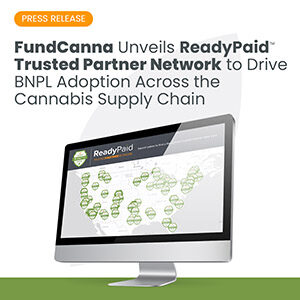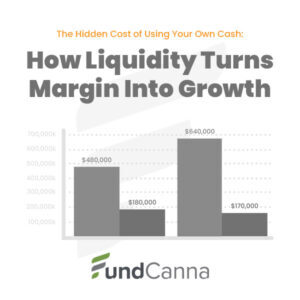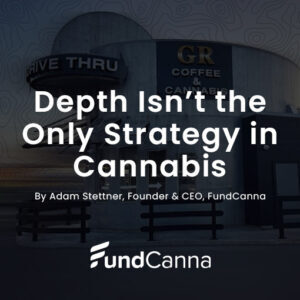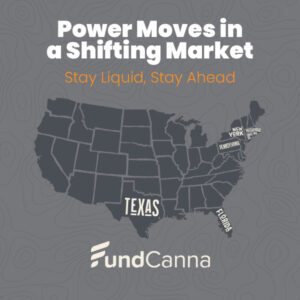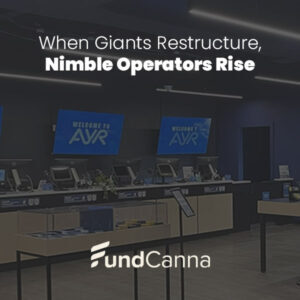Transcript Continued:
Thank you, gentlemen, for shedding light on this. I think this sets up the landscape pretty well for our next, our next question or next topic, which is more oriented to the future. So I actually wanted to start with Henry on this.
I would like to hear you or your thoughts on the emerging trends that are currently shaping the cannabis finance sector. So, Henry, are there any new types of financial instruments you expect to become more prevalent, or how are you seeing the market right now?
I don't know that. I would say it's any new instruments that becomes more prevalent. Obviously we spent a lot of time talking about how 280e will affect financials. I do think that the next, call it five years, cannabis will be an opportunity for operators that show that they can be profitable. And as markets become more competitive, to acquire, and grow their businesses, and they activity that will start to pick up, so I do think we will see a wave of that over the next, call it 3 to 5 years.
As Seth touched on, you know, industries tend to consolidate, over time. And I don't think cannabis will be different, especially as legislation changes and more money starts to pour into the market.
I will say I think there will continue to be an evolution of financial products that constantly are iterated by those that deploy them.
So, for example, the way FundCanna operates today is different than the way it operated two and a half years ago. We offer different types of products. And by that I mean variety, not just evolution. And we're continuing to listen to the market and to look at the landscape and make sure that the product we offer not only matches the need, but matches capacity.
And so, I think that will not change. And, any environment, especially in a healthy environment, and I think, we're not necessarily in that environment yet, but as we become a healthier industry and by that I just mean evolution of law. I think the products will continue to iterate.
But other than freeing up some cash flow, and seeking clarity there, I don't think there's going to be a mad rush. Well, I know one of the comments made, made reference to the fact that when 280e goes away, defaults will go down. And I think in a responsible underwriting environment, that shouldn't be the case.
And the reason I say that is if you're underwriting for current cash flow and then cash flow evolves to accommodate, to add, you would evolve your underwriting the same way in theory anyway. And hopefully close to a practice, you shouldn't really see any kind of, like precipitous drop in your defaults. If you underwrite responsibly now and you underwrite responsibly, post risk scheduling, things should be the same.
You should just be able to deploy more money, not necessarily with less risk.
And, Seth, you said you come from the pharmaceutical sector. So, are there any lessons that can be learned from other industries that might affect the future of financial financial trends in cannabis?
Well, I mean, the question was around future financial trends, right?
So can I go back and answer that question? I think one thing that you're going to see is that nincompoopery is going to continue to be tolerated, maybe not rewarded. So I can think of four public companies that giving their impending debt maturities, and I've spoken about it very publicly, should probably not exist.
And there's not a forcing function for that in cannabis like there is in other industries to create market efficiency. So I think if there is someone who raises a large enough pile of capital, that's new to create a forcing function in the industry, that could be very interesting. Something which I've seen privately and I haven't seen it broadcast publicly yet.
Is that, there's a rumor of a, historical SPAC operator in the cannabis industry who's out trying to raise another SPAC. which, if that SPAC gets raised, I think will annoy me. On the level of, you know, someone who's, like, a lifetime Yankees fan watching the Red Sox win the World Series, I don't think that, you know, there's so many great places for capital to be deployed in cannabis.
You know, if that piece of paper clears, it just basically tells me that the world investment client is not open to to really the great opportunity. On the pharmaceutical side, I think what you're going to see and I think if we take a lesson from there, you know, most large pharmaceutical companies have become acquirers of smaller, more innovative companies that do things that they can't do.
And I believe that trend is going to come in cannabis at some point. and I believe there's going to be some catalyst for it. And if there's, you know, one lesson that I take from pharma is that, you know, the GTI's and the Verano's and the CuraLeaf's and the Terrascend's of the world are either going to have to acquire innovation and cash flow, or they're going to have to be acquired.
And if you look at JNJ and Pfizer and GSK and Novartis, that's how they've grown. And I think you're going to see that model deployed out hopefully in the next decade in cannabis. And that's, you know, what I'm hoping for.
Uber insightful answer. Thank you.
When we were coming up with the webinar, we thought about the folks, looking at, watching and watching this on YouTube, which you can always go and check, like, subscribe, save.
More on each one of your, let's say, business model. Your offer. I want to, I want to go ahead and start for it by you, Henry. I wanted to ask you about, let me check my notes, because I want to be clear. I want to quote your value added construction lending strategy.
So, I know that there's a couple strategies there in terms of of lending for real estate. I wanted to talk about value add construction lending strategies, stabilize lending strategy. What are these strategies? If you can tell us a little bit about, for entrepreneurs out there.
Sure. So, as a mortgage REIT, Pelorus is a lender, for real estate, specifically to the cannabis industry.
And we, we focus on either value add or construction lending or lending to stabilized real estate assets, and a value add or, or construction loan will be either a refurbish or built to spec cannabis production facility. Most often we will look at obviously retail and other sites as well. One of the things that's unique to cannabis is that, the easy thing is to say these are industrial buildings or they're greenhouses, but the reality is they're very specialized pieces of real estate.
I guess a comparable might be like, a data center that is housed in an industrial building, but the equipment that's inside is a very specialized industry and also carries a significant cost. So we will look at the full project scope when we're evaluating a value add or construction loan. The cost is what goes into it.
And then what's that market value upon completion? For a stabilized loan, we're looking at the same real estate, but we want to see that it's been fully completed. And when we look at it as a stabilized deal, not only are we looking for real estate completion, but we also want to see that the operating business is stabilized and cash flowing at a level that is going to meet our underwriting requirements.
Get the funding you need. FAST.
Approvals in as little as 24 hours
Excellent. That's great. Seth you were going to say something? Okay. So, yeah, that's, great to have an idea of what's the palette out there of options, in terms of expanding operations, Adam, I was, I've been also stalking your website and going through the company and seeing what you have there.
And I see that you offer something that is there, as a cultivator, it's one of the things that you're always, you know, crunching numbers and seeing how you're going to make ends meet. that's, capital for, working capital and, you know, investment to make your business more efficient. And that's very important, especially in cannabis.
So forget about if you're doing it indoors, you need air filters. You need, you know, some water solution. You need all these kinds, all this stuff that actually help you be more efficient and, you know, ensure that cash flow and all the things that are so important that we've been discussing so far. So can you tell us, story of success of, folks who said, who came to you and said, hey, Adam, look, we know, we have shown, we can show you that if we buy this piece of equipment, we're going to make this flower more potent.
It's going to be, you know, a higher price in the market or whatever. And that actually worked. so can you tell us a little bit about these best practices and the solutions that you offer?
So I can give two examples, because this was for anyone that's watching this live or later. This was not planned. So so I want to make sure that the audience realizes I don't have that example queued up, but I can give two examples that are slight variations on your theme.
One is a crude oil manufacturer, and the other is vertically integrated, both, cultivator and retailer, and the manufacturer, the way that was used was there they have to take orders. And then the way our funding would fit in, they take orders, they pay COD. So for a manufacturer of crude oil, he's buying biomass.
He's buying flower. He has to buy that. Let's say he buys a half a million worth of flower to manufacture oil. It takes him four months to do that. And, so he's got a lot to test. He's got to do all of this, and then he delivers the product on the order. And then he gets paid.
But that money was parked for four months. And all the while, additional orders, he's locked up because he's got his money in this biomass and manufacturing process. So even if he's given terms, those terms are 30 days. His cycle is four months. So we started funding his purchases of biomass and then as revenue would come in, he would pay us down and then he would draw again, revolving, that cycle.
Now he ended up borrowing from us, 22 times. He was borrowing in various stages, but ultimately, his business grew 350% because he was able to borrow to fund his growth. And then on the vertically integrated side, there was a guy, pretty large company, a multi-state operator. But they also came to us to say, hey, we need we have where footage but it's not built out, doesn't have lights, doesn't have HVAC.
We want to build more grow rooms. and so we funded the construction for further build out of a facility, that also ended up leading to more outdoor grow greenhouses outside of his indoor grow facility. They went from -6 million on an EBITDA to break even to now, plus 9 million EBITDA. and it was really using our money to fuel the growth.
And now they continue to use us for, nutrients. So they're buying all of their nutrients, using our capital. And then as, all those grow rooms, they're all obviously staged and stacked. As revenue comes in, they pay down and start over. We pay the nutrient suppliers direct. They don't even have to deal with the bill, and then they pay us down over a period of time, and they control the cost because they can pay us any time they want and pay only for time used.
So, we've we've worked that way, with all segments, both ancillary, and supply chain. and that's, I would say the most common way, you know, two examples of the most common way that our funds are used.
Seth, I love your, Vader's voice back there, you know, I know you from, from working from Benzinga. And there's something that Pato pointed out, earlier today, and that's so, like the humane, soft, whatever you want to call it, part of dealmaking and matchmaking and finding people with needs and finding people with solutions and connecting these, to, so, like, different ways, to make, to achieve something or to, you know, create a business.
So I was wondering, in the process of connecting folks and matchmaking, are there any, you know, when folks looking for financing may address this and be like, well, you know, it has to be. It's a complicated process. I'm not really savvy, you know, I'm a cultivator or I'm extractor or, you know, whatever your part is in the supply chain, I'm not really a finance guy.
So is there any advice that you provide through this process? Is it always tough love that they come to you and you're like, bad breath out of here? Or is it like you got bad breath? But let me give you this, you know, wash whatever you use for against bad breath. But, you know, so, like, there's any comeback for certain businesses, or is it, because I bet that not everything is so black and white, right?
Sometimes you have to so, like, build out the the relationship and you're like, there's some trouble with you, but I'll help you get there. Is that something that happens?
Absolutely. You know, look, people hire me, help them raise money and buy and sell assets. Like, that's what I do. When you're getting hundreds of inbound things to review, and I don't have, you know, the weaponized version of a fund like FundCanna or Pelarus, you know, it's very easy to kind of be dismissive and just say no to a lot of things harshly.
I don't think there's enough honesty. I think the reason that people tend to work with me is that I'm honest, and I keep my mouth shut. So, you know, if I take something on, there's usually kind of three factors that I look at before I just say you have bad breath, or I say you have bad breath and I can help you, you know, not not normally.
It's kind of okay. What do you want to go and do? What do you think it's worth? So how much money do you need to raise? What do you think valuation your company is or how much you want to pay for it? And what's the market look like? Right. And if there's not an intersection of those three things, I don't care how good I am, I don't have, you know, magic beans.
I know what getting money from Henry looks like in terms of its cost of capital. I know the kind of things that he wants to do. I know what getting money from Adam looks like and what the cost of capital is, and the kind of things that he wants to do. If you have something that doesn't fit for us, doesn't matter.
You know, if it doesn't matter how good I am or. Is my internet going out there now?
We can hear you. We, the image just it's a little bit choppy, but we can hear you fine. Yeah. We have some questions, on the chat. Thank you. Seth, we got you perfectly. Yeah. I mean, it's really an amazing conversation.
We are receiving a lot of love. There's a lot of people watching. so if you agree, gentlemen, then I think we can jump to the chat questions. and I would like to start one with one. I think we can display that question on screen. Let me just one second here.
Because, the first one is about like it's modeling from what Seth said earlier.
I got it. What sort of models do I think don't work yet? Just a brand. Its just taking your brand and putting across a couple different form factors in a state that's already deeply kind of in like California.
Like if I want to have the Seth brand tomorrow and I don't have, you know, cultivation or I don't have extraction or I don't have some other level of infrastructure or I don't have retail exceptionally hard. So, you know, if someone comes to me and says, well, I have a great idea for a brand in California and that's it, it's not going to happen.
If I see another deal for someone who wants to build a humongous greenhouse in New Jersey, is that going to happen? So don't come to me with a greenhouse in New Jersey. We don't need more cultivation in New Jersey. You don't need 1,000,000ft² of cultivation in New Jersey, and you don't need a greenhouse in New Jersey. So when you have something in a state where you just know the supply and demand economics of what exists, what's already built, what's in process and where it's going, that's a model that's not going to work.
That's very clearly kind of a no. Another thing, if you just have a retail license, you need to listen to me. I don't care what you think. It's worth it. It's worth 50% of what you think it's worth. If you've never been in retail before and you've never been in cannabis before. So I can tell you in every state that I go to, I meet someone that says, boy, gosh darn it, I just got lucky and I got this license and I think it's worth $17 million.
It's not a lottery ticket. So those are three very distinct models that I see a lot. That, and I'm not going to say you're not going to make it. Maybe you will make it. I hope you make it. Please prove me wrong. But when I just look at empirical data, your probability of raising money is single digits and your probability of success is single digits.
Now that was the probability of putting human space travel on the moon. So maybe I'm incorrect. But those are three models that clearly aren't going to be highly successful in raising money.
Thank you. Seth. Henry. Adam, do you have any comments on this?
The only thing I'll say is, that the data that I've got access aside from, you know, the the Headsets, the BDSA's, etc., and the MJ biz factbook, right?
The data that I've got access to is our data, and so on. The roughly 3000 or so applicants and, and what I can say is there is a big difference by geography and vertical in terms of, performance. Once they're on our books, there's a big difference in terms of predictors and cash flow as we underwrite.
But we, because we're different than Seth. If I'm talking to let's just, just stick with his example. A guy that is running a cultivator in New Jersey, we're looking at his financials before we give him capital. So where Seth may be looking at the prospect or the idea of building that out, we're only looking at the guy that's already doing it.
And we just come from a different place. And so I think Seth has actually a better view than I on the areas that, that at their state, or stage of infancy, what has a greater chance of success where I can tell you once already operating, I can see where the stability lies both by geography and segment of the industry.
Not much specific to, just, back to the focus on markets. Look at where the state you operate in is in its life cycle. And who would you be competing against? And when you're online, what percentage of that market share do you need to take? If you've underwritten to something where you need to grab 25% of a market, that's going to be very challenging to do.
So it's not specific to one vertical necessarily. It's just look at the fundamentals of your state and look at who's online or coming online.
That's very good. So I think we can jump to the next one. I think there's someone asking about tips. Let me see if I can bring up the question okay. Tips for Pre-Revenue startup with founders who have a proven track record of sales in the market.
Do you see the question on screen right. But again, we can take it or not. It's just your call.
So, how much truth do you want to hear? Like pre-revenue startup with founders or have it proven record sales? That's awesome. Like go call grandma and a half million bucks and start the company.
Like, it's just going to be very hard to raise money for that. Thank bootstrapped like my suggest as bootstrapped.
Yeah, that's the optimistic answer. Bootstrap and prove to investors you don't already know that you're investable by showing them results are great.
Thank you very much. And I think we have another one here. There's also a lot of doubt, like for state specific, situations, I don't think we'll have a lot of time to address that, but I'd love to, to to ask our audience to also drop those questions in the chat.
So maybe we can address that on the comments. later, after the live show. But, let me see if we have any other question.
Okay, there we go. What are your views on opportunities outside the US, like for example, the United Kingdom, Germany, broader Europe, etc.?
I think that if you ask me in my lifetime, the opportunity is massive. I think if I were trying to throw the dart at the board, I'm wearing a blindfold as to when that happens. But I will say that again, back to data. If you look at Germany, the amount of people that either live within Germany or directly border, it is roughly 70 or 75% of the population of the US.
So I think that the general trend is, as Germany develops and evolves and where their legislation lands, I think much of the EU will follow. and then from there you'll see more internationally because there's many existing trade agreements, that exist, between EU and nations outside of the EU.
Interesting. Okay. If there are no more comments on this one, maybe we can jump to the next one.
You know, European markets are really hard for me to understand. from a commercialization perspective, I have tended to focus on Australia, and I'm involved in the largest and as the largest operator, there was a company called Canna Trick. And I think that's going to be a phenomenal market.
It's just been much easier for me to get my hands around. I do think that the EU and specifically Germany will be good markets. I just don't know how to interface there, from an investor or operational perspective, it's just I'm too far removed. Right.
And I'll just say we're looking at four other regions, Canada, Europe, Latin America and Australia.
The only reason we may start with Canada for just the reason that we have a partnership opportunity and it's the easiest in terms of setup. But, you know, you enter every new market with a lot of caution. and, will do that, as well. But I don't have a great answer for the individual that asked the question.
Thank you. I just want to say that the rescheduling of cannabis also creates an important precedent for other countries. I'm thinking on the Thai example in Thailand, which recently went back on its feet and again, the US being the main sponsor of prohibition and now going backwards now again, it might create rescheduling, might also create a new wave of, of policy around the world.
So also, yeah, it's absolutely, something to guess on the future, but hopefully this, creates, again, a good precedent. so, let me see if our producer can throw in another question. And I think we can wrap up this conversation. And we this has been like a hurricane of insights and very detailed information. yeah, a lot of homework.
I actually want to jump. I'm going to jump on this one. I actually made reference to this earlier. Gregory, I saw the question fly by as we were talking and what I'd say is, there's no doubt more choice in any market as it matures more choices of, and so I think that will be the case here.
I don't know, this is a vice industry, like alcohol, like tobacco, like so many others. Right? Firearms, pornography, etc.. And and so, I don't know how quickly others are going to come rushing in because on a relative basis, the legal industry is still pretty small. Now, having said that, if regulation changes, there's a lot of opportunity for us to grow, you know, beyond the projected 35 or so billion annually.
But I go back to my answer, Gregory, earlier regarding the lower default rates, I think that that effective risk management should and credit policy should dictate not, precise outcome, but a range of outcomes. And I think that'll be the case as the any, landscape evolves, you're if you're good at what you do and again, I'm not implying, that I'm speaking about fund can I here.
But if you're good at what you do, you evolve with the times. And so as regulated evolves, your policy internally should evolve. And that might mean that you get looser. It might mean that you get tighter. and for that reason I don't necessary expect lower default rates. But I do expect more choice. And and I hope although it's two different answers, I hope it answers the question you're asking.
Again, just my take. I open it back to to Henry and Seth.
I mean, I didn't get a chance to chime in on that question, but I think that Gregory, if that's who asked the question, is, is kind of correct. I mean, let's make the assumption that schedule three happens. So let's make the assumption that maybe he goes away, depending upon what you believe, there's somewhere between 2 and $3.5 billion of cash that's now being paid to the government.
That's not going to be paid to the government. And I think that, you know, the 15 or 50 largest companies in the industry are probably going to benefit the most from that. So if you're a Curaleaf Trulieve guy, Verano, and you have an extra $150 million of cash on your balance sheet, you're probably going to pay off debt.
Like that's probably the prudent corporate finance thing to do. So I do think that what will happen is you'll have some level of de-levering. I do think you'll have, I hope, a slightly lower cost of capital for people. I do think you will see a proliferation of the zombies. Some of the companies that should be dead will get another breath of life.
I don't know that a bunch of private equity companies are going to come in as a result of that, because they're still federally not allowed to. But I do think that, you know, you'll see this kind of spiral of those events happen. I also don't think that default rates are necessarily going to be any lower, at least not for for certain types of credits, that's for sure.
Thank you very much. And Henry any thoughts on this question?
I would agree with what Seth said about the default rates we've touched on throughout the conversation. I think in general, cannabis capital markets will open up as to it is lifted, not specifically just debt. if anything, I think that cannabis that's been more influenced by the rate cycle over the last two years, and we've seen them become less crowded as, rates have gone up elsewhere and capital has left to be redeployed and other asset classes outside of cannabis.
So if anything, as capital comes in, I think it will flow to the specialized groups that know the marketplace. and that's not to say that there won't be new entrants as there are in any industry, but I think that specifically has seen more impact from the rate cycle. But I do think that capital markets will open up as to it is lifted, and that will be a benefit for existing investors and also operators.
Just the industry at large.
Thank you very much. And well, Adam, Seth, Henry, this is been a really, really insightful discussion. We are really grateful for your time and I just wanted to leave you some space for any final thoughts or closing remarks. You want to add? Want to go ahead, Adam?
Sure. I would encourage anyone that's curious about what we do to call in and speak with, someone at FundCanna.
We don't charge for conversations, and our job is to be consultative. So if you've got questions, my suggestion is, please, reach out and ask them. and I see our URL is up. Thank you for that. Feel free to visit the website. But but I always think that interaction with another person, is beneficial. So they're there.
Really I, I'm a lifelong learner. I always say never a professor, always a student. And so, if you've got questions, it can't hurt to get someone's perspective, knowing that there's no obligation. So, please call in.
I would just say anybody who wants to get a hold of me, I have a very small social media presence on LinkedIn, so you can get me there.
Very, very subtle. And, you can send me an email to my email address and happy to be helpful. please don't be offended if I can't help you. My, the most valuable, precious commodity I have left is time. And I'm trying to spend it on things that I know I can get done.
So, you know, I do say no. And when I do say no, I mean no. so. But, you know, look, I think I have an ongoing dialog with about 100 people a week in the industry, and it's usually about 50 CEOs of companies and about 25 people, you know, like, you know, Henry and Adam and 25 other, you know, bankers and service providers.
So I think I have a very good understanding of what's possible. And if you have an operational company and you know, you want to understand what's possible, please call me. And I'm happy to, you know, tell you what I think. But, bullish on the sector. I'm not going anywhere unless they put a bullet and a great this is my year.
And thank you for having me. Appreciate the opportunity to speak. And if anybody wants to reach out on an email or open up for capital Group to discuss cannabis real estate financing.
Thank you to Benzinga and Cannabis Insider and my co-panelists for the platform and for the opportunity. Grateful. Can't believe anyone would ever want to spend an hour and 31 minutes listening to me talk. So grateful for the opportunity to be here.
Awesome. Thank you very much for tuning in everyone!
Get the working capital you need. Fast.
Approvals in as little as 24 hours
More From Our Blog
Follow Us
Explore
info@fundcanna.com




